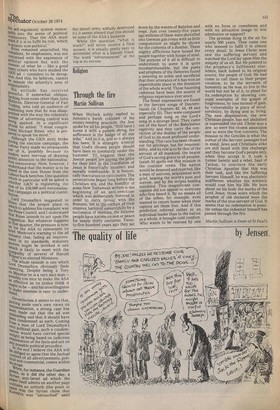Religion
Through the fire
Martin Sullivan
When Shylock . softly replied to Antonio's harsh criticism of his money-lending practices, the Jew spoke for all his people, "Still have I borne it with a patient shrug, for sufferance is the badge of all our tribe." And so it is and so it always has been. It is strangely ironical that God's chosen people should have been so constantly under the hammer. To suggest that the Jewish people 'are paying the price for their part in the crucifixion of Jesus is historically incorrect and morally indefensible. It is historically inaccurate on two counts. The persecutions began long before the Christian era, and the hostility of some New Testament writers is the beginning of an anti-semitism which was deliberately fostered in order to curry favour with the Romans. Set in the cockpit of rival empires, battered unmercifully by a succession of enemies, the Hebrew people have known no rest or peace for nearly thirty centuries. Twenty-five hundred years ago they sat down by the waters of Babylon and wept. Just over twenty-five years ago millions of them were shovelled into German gas ovens with as little compunction as might be shown for the contents of a dustbin. These mighty afflictions have bound the people together with hoops of steel. The purpose of it all is difficult to understand; to some it is quite incomprehensible, but the poets and prophets of the Hebrews found a meaning so noble and sacrificial that their utterance of it has won an imperishable place in the literature of the whole world. Those haunting cadences have been the source of religious experience ever since. The finest expressions are found in the Servant songs of DeuteroIsaiah (in Chapters 42, 44, 49 and especially 53). They were composed and perhaps sung as the Lord's song in a strange land. They came out of the heart of the Babylonian captivity and they carry the conviction of the destiny of the people of God to its most profound understanding. This race has been chosen not for privilege, but for responsibility, and its role is to be that of the servant of all mankind, the bearer of God's saving grace to all peoples. Isaiah 53 spells out this mission in the costliest terms. The nation would be despised and rejected, like a man of sorrows, acquainted with grief, bearing the world's pain and sorrow, and by his stripes healing mankind. This magnificent conception did not appeal to everyone who first heard it. By no means all of the tribes, for example, even wanted to return home when their captors set them free. And if this prediction referred rather to an individual leader than to the nation as a whole, it brought cold comfort. Who wants to be rescued by one with no form or comeliness and with no attractive image to win admiration or support?
The promise hung in the air for nearly 500 years. Then came one who seemed to fulfil it in almost every detail. In Jesus Christ men saw the suffering servant and watched the Lord lay upon Him the iniquity of us all. But He pointed to the prophecy's fulfilment elsewhere, back indeed to its original source, the people of God. He had come to call them to their proper vocation, to be the servants of humanity as He was, to live in the world but not be of it, to plead for its redemption by showing constant examples of the gospel of forgiveness, by loss instead of gain, by vulnerability in place of invulnerability, by dying and so living. The new dispensation, the new Christian people, has not abolished or superseded the old. Christ was a Jew, so were His closest associates and so were the first converts. The mission to the Gentiles is what the author of the Servant passages had in mind. Jews and Christians alike are still faced with this challenge and they become God's people only when they accept it. It took a former heretic and a rebel, Saul of Tarsus, to convince the early Christian Apostles that this was their task, and like the Suffering Servant Himself, he was absolutely indifferent whether his ministry would cost him his life. He bore about on his body the marks of the Lord Jesus, those scars which the prophet of old declared were the marks of the true servant of God. It seems that no redemption is possible unless the redeemer himself has passed through the fire.
Martin Sullivan is Dean of St Paul's










































 Previous page
Previous page